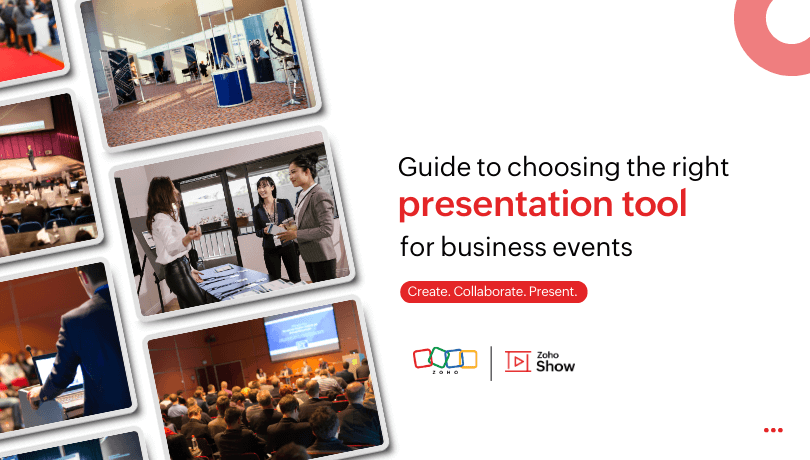- HOME
- Business & tech
- 100 engaging presentation topics for students
100 engaging presentation topics for students
- Last Updated : June 30, 2025
- 31.1K Views
- 12 Min Read

A student's life is always busy and exciting. With your packed schedule of classes, homework, projects, and favorite extracurricular activities, there’s always something going on.
But there’s also that constant desire to stand out and make your mark. That’s where presentations come in. This is a medium to share your ideas and knowledge in a dynamic way. But how do you make your presentation stand out?
It all starts with picking the right topic. A trending topic that interests you and resonates with your audience can make a huge difference in keeping your peers engaged.
In this blog post, you’ll explore some fresh and exciting presentation topics and learn how to choose one that will leave a lasting impression.
How to choose the right topic
Before you dive into choosing a topic, here are a few tips to help you narrow your choices.
Determine the goal of your presentation
Be clear about what you want your audience to learn or feel by the end. Your presentation should leave everyone feeling like their time was well spent, including you.
Consider your interests
Picking a topic you're genuinely excited about is the secret to having a successful session. When you're passionate about the subject, you're more likely to know it inside and out, making it easier to handle any questions that come your way.
Ensure it's relatable
When choosing your topic, consider your audience. Think about what type of content will impress them the most. Keep in mind their interests, knowledge levels, cultural backgrounds, and personal experiences. This is important because you want to keep your peers engaged and make sure they don’t feel bored or confused during your presentation.
Suggested presentation topics for students
Finding a topic that will feel fresh to your audience can be difficult and is time consuming. Here are some fresh ideas across various categories to get your creativity flowing.
Presentation topics on technology

1. Future of work: Discuss how technology is transforming remote work culture and the gig economy.
2. Gadgets that make life easier: Showcase new, quirky products that have the potential to make daily life easier and share your perspective.
3. Fashion and functionality in wearable tech: Talk about how smartwatches and fitness trackers are revolutionizing health and fitness while raising your fashion game.
4. Building a personal brand on social media: Examine how social media can be a powerful platform for entertainment while also building and shaping your personal brand.
5. Tech for good: Highlight positive technological advancements, such as apps that promote mindfulness or environmental sustainability.
6. Privacy in the digital age: Explore the challenges of maintaining privacy in an increasingly connected world and the role of encryption, data protection laws, and user awareness.
7. Voice assistants and the future of user interfaces: Analyze how voice technology, like Siri, Alexa, and Google Assistant, is shaping the way we interact with devices and access information.
8. Smart homes and how they make life easier: Explore how connected devices like smart lights and speakers are changing our daily routines.
9. Excessive screen time and how it affects sleep: Discuss how using phones at night can make it harder to sleep and how to fix it.
10. Digitalization of health and fitness: Share your thoughts on how smartwatches, trackers, and health apps help people stay fit and monitor their well-being.
11. Digital payments and the cashless world: Show how online wallets, UPI, and tap-to-pay are replacing physical money. Weigh the advantages and difficulties adapting to digital payments.
12. Behind the apps we love: Give a peek into the tech that powers popular apps like Instagram, Spotify, and the like. To dig deeper, present on how they were able to develop something unique and build a strong brand.
13. How kids use tech differently from adults: Compare how children, teens, and grown-ups use gadgets in different ways. Look into how age affects what we use tech for, like learning, gaming, working, or socializing.
Presentation topics on education

14. Power of storytelling in teaching: Discuss how storytelling can make complex concepts more relatable and engaging.
15. Benefits of outdoor learning: Debate on the importance and benefits of nature-based education and how it can be more engaging in this digital age.
16. Podcasts as a learning tool: Exchange views on how podcasts can transform the learning experience for students by enhancing their understanding of the syllabus and exploring topics beyond it.
17. Financial literacy in schools: Examine why teaching financial literacy is essential for preparing students for adulthood. Briefly describe the concepts that would be helpful and why.
18. Advantage of peer teaching: Present on how peer teaching can enhance understanding, foster collaboration, and improve social skills. Also mention different ways in which this can be achieved.
19. Rise of edu-tainment: Explore how educational content on platforms like YouTube is making learning fun and accessible.
20. Role of emotional intelligence in education: Explain how understanding emotions can improve classroom interactions and how a student learns.
21. Global classrooms and cultural exchange: Discuss how connecting students across countries builds cultural understanding and new perspectives.
22. Project-based learning in schools: Debate if real-world, hands-on projects deepen understanding and encourage teamwork compared to the regular approach.
23. Human side of school education: Analyze how classmates, teachers, mentors, and even school staff shape a student’s motivation, confidence, and learning experience.
24. Inclusive education for all: Talk about strategies for making classrooms accessible and supportive for students with diverse needs.
25. Importance of art in education: Highlight how subjects like music, dance, and painting nurture creativity and emotional development.
Presentation topics on brands and businesses

26. Impact of the customer experience: Analyze how exceptional customer service can differentiate a business in a crowded marketplace.
27. Importance of corporate social responsibility: Discuss the role of CSR in modern business practices and its benefits for companies and communities. Use different case studies to make your presentation more engaging.
28. Why brand loyalty is crucial: Give an overview of the concept and discuss strategies for building and maintaining brand loyalty among customers.
29. Insights on consumer behavior: List the factors that influence consumer decisions within different age groups and how businesses can leverage this understanding.
30. Effectiveness of word-of-mouth marketing: Discuss how businesses can establish credibility and trust by promoting word-of-mouth marketing.
31. Understanding competitive business landscapes: Break down how businesses can assess their competition and identify opportunities for differentiation.
32. When and why rebranding works: Study examples of successful and failed rebranding efforts to understand the risks and rewards.
33. How luxury brands work: Examine how luxury brands maintain exclusivity, pricing power, and customer desire. Use case studies to make the presentation more relatable.
34. Branding beyond the logos: Share your perspective on how colors, tone, packaging, and customer service together define a brand’s personality.
35. Brand failures and what we learn: Review branding mistakes from known companies and the lessons they offer. Note what can be done differently and discuss it during the presentation.
36. Influencer partnerships and its effects: Explore how collaborations with influencers are shaping modern brand marketing and the effect it has on individual brands.
Presentation topics on nature and the environment

37. The concept of urban greening: Emphasize the benefits of green spaces in urban areas and how cities can incorporate them into their landscapes.
38. Eco-friendly innovations in fashion: Explore how the fashion industry is adopting sustainable practices, such as using recycled materials and reducing water usage.
39. Food waste and consequences: Stress how food waste contributes to environmental degradation and review strategies for reducing it.
40. Eco-tourism: Discuss how eco-tourism promotes conservation, supports local communities, and reduces the environmental impact of conventional tourism.
41. Habitat loss and species extinction: Inspect the connection between habitat destruction and the extinction of species, with a focus on conservation strategies.
42. Magic of seasonal changes: Pursue the science and beauty behind changing seasons and how plants and animals adapt to these transitions.
43. Influence of nature on human creativity and culture: Present your findings on how nature has inspired art, literature, and cultural traditions throughout history.
44. Wonders of the night sky: Emphasize the beauty of celestial bodies like stars, planets, constellations, and how they’ve shaped human understanding of the universe.
45. Can plants talk?: Dig deeper into the fascinating research on plant communication through signals, scent, and root networks.
46. Ocean's deepest secrets: Research on the darkest parts of the ocean and learn more about strange creatures and unknown ecosystems.
47. Nature's time keepers: Investigate how animals and plants know when to migrate, bloom, or hibernate without clocks or calendars.
48. Life under different skies: Explore how light, weather, and skies change in deserts, forests, and polar regions.
49. Colors of the sky: Think about why the sky is blue, the sunset orange, and the twilight purple. Discover the science of scattering of light.
50. Natural healing and how it works: Learn how nature’s calm can help people recover from mental and physical fatigue.
Presentation topics on entertainment

51. Globalization of entertainment: Present your observations on how entertainment from different countries has gained global influence.
52. Film festivals and independent cinema: Share your thoughts on how festivals like Sundance and Cannes launch careers and influence the film industry.
53. Future of live events: Explore how concerts, theater performances, and sports are integrating virtual elements to reach a global audience and how this can shape the future.
54. Celebrity culture and its influence: Examine the effects of celebrity culture on public behavior, social trends, and consumerism.
55. Cultural impact of superhero movies: Discuss how superhero franchises like Marvel and DC have shaped modern cinema and global culture.
56. Intersection of technology and entertainment: Explore how innovations like AI, CGI, and AR are pushing the boundaries of movies, music, and gaming.
57. Evolution of music genres: Do research on how music genres like rock, hip-hop, jazz, and electronic music have evolved and influenced one another.
58. Fandom culture: Look into how fan communities influence what content gets made and remade.
59. Comeback of nostalgia in entertainment: Explore why reboots, remakes, and retro music are making a strong return.
60. How movies are made: Take your audience through the steps of film production, from script to screen.
61. Reality TV and its effects: Analyze how reality shows influence behavior, trends, and our ideas of fame.
62. Street performers and local art: Highlight the value of entertainment that's closer to home and how it keeps culture alive.
63. Voice acting and dubbing industry: Dive into the art of dubbing and how voice actors bring characters to life across languages.
64. Gaming as a career: Talk about how playing video games, competing in e-sports, and streaming online are becoming real jobs that people can do for a living.
Presentation topics on human values

65. Courage to stand up for what's right: Discuss the value of courage in addressing social injustices, standing up for personal beliefs, and overcoming challenges.
66. Importance of tolerance: Explore how practicing tolerance in everyday life helps us accept people's imperfections, mistakes, and differing opinions to reduce unnecessary conflict in personal and professional relationships.
67. The silent power of listening: Examine how active listening is an underrated yet powerful way to show respect and build trust.
68. Value of authenticity: Present on how being true to oneself, especially in the age of social media, is a rare yet valuable trait.
69. Strength of humility: Analyze how humility, often seen as a weakness, actually contributes to stronger leadership and personal growth.
70. Power of saying no: Share your thoughts on how the ability to say no and set healthy boundaries is crucial to personal well-being and self-respect.
71. Forgiveness and healing: Reflect on how forgiving others and ourselves contributes to emotional freedom and peace.
72. Patience in a fast-moving world: Talk about the value of patience in building skills, relationships, and a balanced life.
73. Loyalty and trust in relationships: Examine how loyalty strengthens bonds and how it must be balanced with self-respect.
74. Modesty in achievements: Present your thoughts on the value of acknowledging success while staying humble and respectful. Give ideas on different ways to maintain the balance.
75. Curiosity as a value: Discuss how an open mind drives learning, empathy, and personal growth. Also mention the healthy boundaries to be kept while being curious.
76. Self respect as a foundation: Analyze why and how respecting yourself fuels motivation to improve and keep learning without harsh self-judgment.
77. Team work and shared success: Discuss how working together teaches trust, responsibility, and respect for others’ ideas.
Presentation topics on food and nutrition

78. Role of nutrition in mental health: Get deeper into how food choices influence mental well-being, exploring the link between diet, stress, anxiety, and depression.
79. Understanding food labels: Help your peers decode food labels, from nutrition facts to ingredient lists, and explain what terms like "organic" or "natural" really mean.
80. Nutritional myths: Examine popular nutrition myths, such as "carbs make you fat" or "all fat is bad," and present evidence-based facts to debunk these misconceptions.
81. Importance of mindful eating: Explore the concept of mindful eating, how it helps with weight management, and its benefits for mental and physical health.
82. Impact of food marketing on our eating habits: Analyze how advertising, packaging, and food trends influence consumer choices and have the power to steer us toward less healthy options.
83. Meal planning for busy lives: Highlight how organizing meals in advance can improve nutritional quality, reduce everyday stress, minimize food waste, and save both time and money.
84. Cultural differences in diets: Compare eating patterns worldwide and what we can learn from traditional food habits.
85. Handling emotional eating: Discuss how feelings like stress or sadness can affect what we eat and how we can find better ways to handle those emotions.
86. Advantages of seasonal eating: Share how eating fruits and vegetables that grow in the current season can be better for health and the planet.
87. How salt affects health: Talk about how extra salt in our food can lead to health problems over time. Also explain why it’s important to check salty snacks and packaged foods before consuming.
88. Nutrition for different age groups: Explain how dietary needs change from childhood to old age and why tailored nutrition matters.
Presentation topics on travel and tourism

89. The role of festivals in tourism: Discuss how local festivals and events can attract tourists and boost regional economies.
90. Benefits of solo trips: Express your opinion on the personal growth and freedom that comes with exploring new places alone.
91. Gastronomic tourism: Highlight how culinary experiences can be a central focus of travel, offering insights into local culture and traditions.
92. Global hidden travel gems: Shed light on lesser-known travel destinations that offer unique experiences away from the crowds.
93. Traveling on a budget: Provide tips and tricks for affordable travel, from finding cheap flights to exploring low-cost destinations.
94. Travel safety in the modern world: Educate your peers on how to stay safe while traveling, including researching destinations, staying connected, and being culturally aware.
95. Why souvenirs matter: Explore why we buy little things while traveling and how they carry memories beyond the trip.
96. Effect of travel playlists: Share your thoughts on how music becomes part of travel memories and how it sets the mood for road trips, flights, or solo walks.
97. Different types of travelers: Talk about how some people plan everything, while others just go with the flow when it comes to trips. Also try exploring other different ways people approach it.
98. Rise of travel vlogs: Discuss how people now follow travel stories online and use them to plan trips.
99. Eco-tourism and why it matters: Share your ideas on traveling in a way that protects nature and helps local people.
100. Challenges in tourism today: Dive deep into problems like overcrowding, pollution, or travel restrictions, and suggest ways to solve them.
Tips to make your presentation more attractive
After selecting a topic and developing your content, here are some tips to make your presentation stand out.
Choose the right template and theme
The look of your presentation sets the mood for your audience. So, choose your template carefully, and be sure to change the theme to one that matches your content and delivery style. Check out our large collection of presentation templates that you can customize for free.
Visualize data
Often, many students don’t include charts, tables, or infographics in their presentations. Adding these will set you apart and make your presentation look more professional. Looking for different ways to visualize your data? Here's what Show can offer you.
Use path animation for timelines
Apart from using animations and slide transitions, if you're planning to include a timeline, try using path animations to make it more engaging. This will also help your audience focus on one point at a time.
Balance content and design
Avoid stuffing your slides with too much content, as this might cause your peers to lose interest. Instead, try adding limited but impactful content on a clean design. This will keep your audience engaged.
Add media when needed
Audio, video, and illustrations can act as attention-grabbers in your presentation. Just make sure your videos don’t take up too much presentation time.
With Zoho Show, you can source different media from within the interface without switching tabs or downloading them. Check out the wide range of add-ons you can leverage to create compelling presentations.
Final thoughts
Choosing the right topic is like picking the perfect outfit—the more confident you feel, the more successful it will be. Whether you're talking about tech, values, or eco-friendly fashion, make it personal. Remember, school is a great place to try new things and have fun.
Now get out there, nail that presentation, and leave your audience thinking, “Wow, that was awesome!"
Happy presenting!


